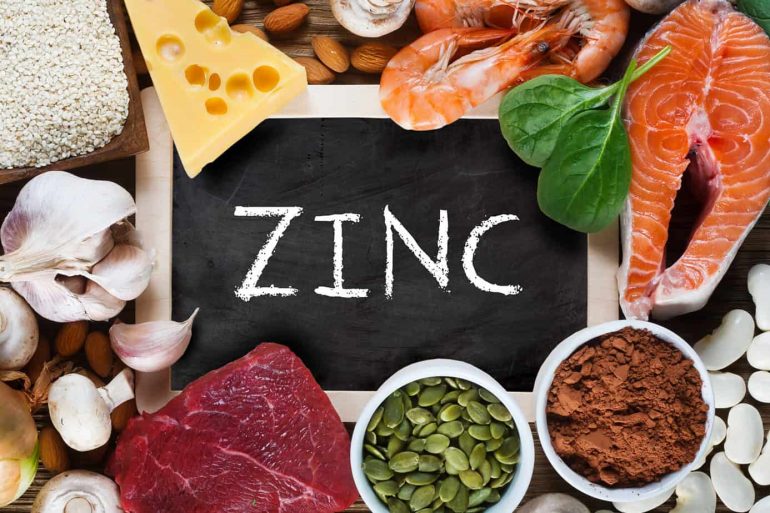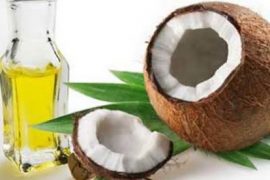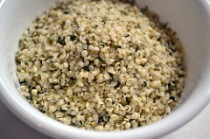The Many Ways Zinc Benefits Your Body
Zinc plays a role in every activity of the body; it is present in every cell and is the second most abundant trace mineral in the body after iron. Zinc is a vital trace mineral, which means your body only needs small amounts, yet it is critical for more than 300 enzymes to carry out their chemical reactions in the body, including digestion, nerve function and metabolism. It also plays a critical role in wound healing, thyroid function, blood clotting, supporting the immune system and in making DNA. Since zinc cannot be stored in the body, it’s important to have a good daily source of this trace mineral. It’s estimated that 2 billion people globally are zinc deficient due to insufficient diets. (1,2,3,4)

14 Benefits of Zinc
Consuming zinc on a daily basis whether through supplements or food is beneficial to your overall health. Here are a few examples of zincs benefits:
Works as a powerful antioxidant: Zinc is an effective anti-inflammatory and antioxidant agent. Zinc helps to reduce your chances of developing numerous diseases as well as fighting oxidative stress. This study shares the encouraging results of zinc supplementation in participants aged 55-87 where infection rates were significantly lowered. (5)
Lowers blood sugar and cholesterol-Although the reason is not clear, zinc levels are often low in people with Type 2 Diabetes. Some studies suggest that zinc may help to reduce high cholesterol levels and lower blood sugar. These conditions can increase your risk for strokes and heart disease. This 2021 research review shows that zinc may also improve blood sugar levels in people with gestational diabetes. (6,7)
Boosts eye health: Zinc helps to convert vitamin A into its active form to maintain healthy vision. Sufficient zinc levels may help to improve night vision and other eye conditions. Diminished vision is associated with inflammation and oxidation, supplementing with zinc can reduce their occurrence. This study published in the Archives of Ophthalmology found that people at high risk for age related macular degeneration (AMD) and vision loss who took a daily multivitamin that included vitamin A, vitamin C, vitamin E, zinc and copper had a 25 percent reduced risk of advanced macular degeneration during a six-year period. (8,9)
Reduce incidence of acne-Acne is a common skin condition, it is estimated to affect up to 9.4% of the world population. Acne is commonly caused by bacteria, inflammation and obstructed oil glands. Both topical and oral zinc can efficiently treat acne by reducing inflammation, suppressing the activity of the oil glands and hindering the growth of P. acnes bacteria. Individuals with acne may also have lower zinc levels. (10,11,12)

Enhances immune function: Zinc is needed to activate T-Cells, which are essential for healthy immune function. Individuals with zinc deficiency are more susceptible to a wide range of illnesses including the common cold. (13)
Promotes wound healing: Zinc helps to treat infections, as well as benefits skin integrity. This study shares the link between slow wound healing and low zinc levels. (14)
Balances hormones and supports reproduction: Zinc is important in the role of estrogen and progesterone production for women, it has also been shown to increase testosterone levels in men and significantly increase sperm motility. Insulin, the main hormone in the regulation of normal blood sugar levels is also balanced by zinc levels. (15)

Boost brain health: Zinc has a role to play in neuroprotection by promoting various healing processes in the nervous system and brain, as well as modulating the response of the body to stress. In fact, the highest amount of zinc is found in the hippocampus. Zinc deficiency in children has been linked associated with lowered learning ability, apathy and lethargy. (16)
Promotes muscle growth and repair: Growth inhibition is a prime symptom of zinc deficiency. Studies have found that zinc plays a critical role in cell growth and cell division, it is needed to maintain a strong muscular and skeletal system. Consuming good sources of zinc on a daily basis helps with the release of hormones needed to maintain a healthy metabolism and healthy muscle mass. (17)
Bone health: Zinc is important for bone and tooth health. Along with additional minerals such as boron, K2, vitamin D and magnesium, zinc has beneficial results in reducing and preventing bone loss. Due to its antibacterial properties zinc is effective against oral health conditions such as cavities, periodontitis and gingivitis. (18, 19)
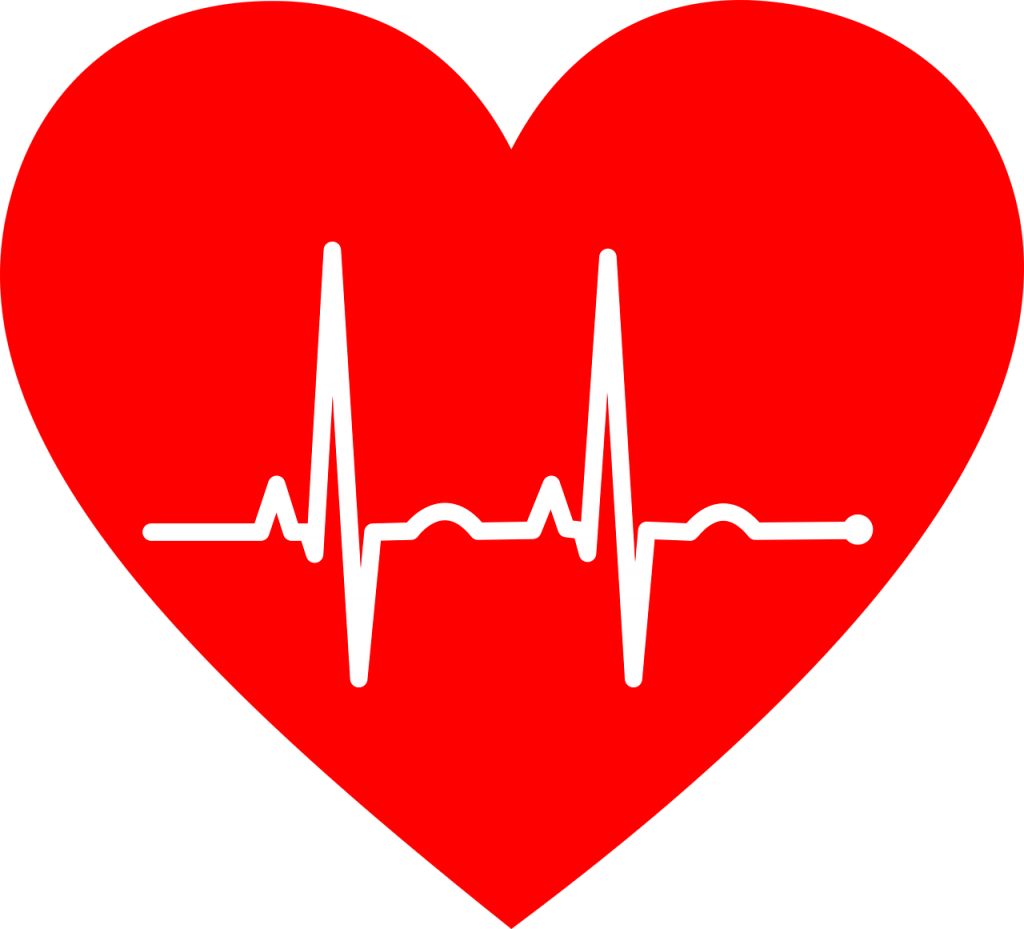
Promotes cardiovascular function: Research has proven that zinc is needed to maintain the health of cells within the cardiovascular system, while also lowering inflammation and oxidative stress. (20)
Promotes digestive health: Many individuals who are zinc deficient experience digestive issues, very commonly difficulty in digesting protein. This is due to zincs role in regulating gastric acidity, in addition to its role in producing digestive enzymes. (21)
Fights chronic fatigue: This study notes the strong anti-oxidant benefits of zinc. Their results also find that chronic fatigue syndrome (CFS) is accompanied with increased levels of oxidative stress. The results of these reports suggest that some patients with CFS should be treated with specific antioxidants, including zinc supplements. (22)
Detoxifies the body: Zinc helps the body to detoxify by enhancing the function of the kidneys and liver. Zinc deficiency is frequently connected to liver cirrhosis, and sufficient zinc levels can help prevent oxidative liver damage. Zinc is also beneficial in preventing kidney disease as well as offering protection from heavy metal exposure (such as mercury and cadmium). (23, 24)

Things that Hinder Zinc Absorption
There are numerous factors that disrupt zinc absorption, including foods, disease and environmental factors such as:
Diabetes
Gastric Bypass Surgery
Pancreatis
Pancreatic Insufficiency
Low stomach acid
High oxalate diet
High phytate diet
Digestive issues such as IBS, cirrhosis, Crohn’s, liver disease, diverticulitis
Overuse of antibiotics
Glyphosate from GMO foods
Glyphosate exposure from herbicides and/or pesticides
Sulfites in wine
Tannins from tea
It’s important to remember that phytates, which are naturally found in nuts, seeds, beans and grains can have an inhibitory effect on zinc absorption. Phytates can bind “ionic” zinc in the intestinal tract reducing its ability to be absorbed as zinc is no longer “ionic” once it is bound. (1)
In the same vein as phytates, oxalates, which are naturally found in bran flakes, nuts, spinach and beets can also have an inhibitory effect on zinc absorption. Oxalates, can bind “ionic” zinc as it is travelling down the intestinal tract thereby reducing zinc’s ability to be absorbed. (1)

What are Zinc’s Side Effects?
Consuming too much zinc in your diet can lead to problems such as:
Headaches
Loss of appetite
Upset stomach, including diarrhea, vomiting, nausea
Copper and magnesium deficiencies
Low HDL levels
Worsening immune function that can lead to increased infections
You should always check with your healthcare practitioner before taking any supplement. Your practitioner can always order a blood test to determine your zinc levels if you have any concerns.
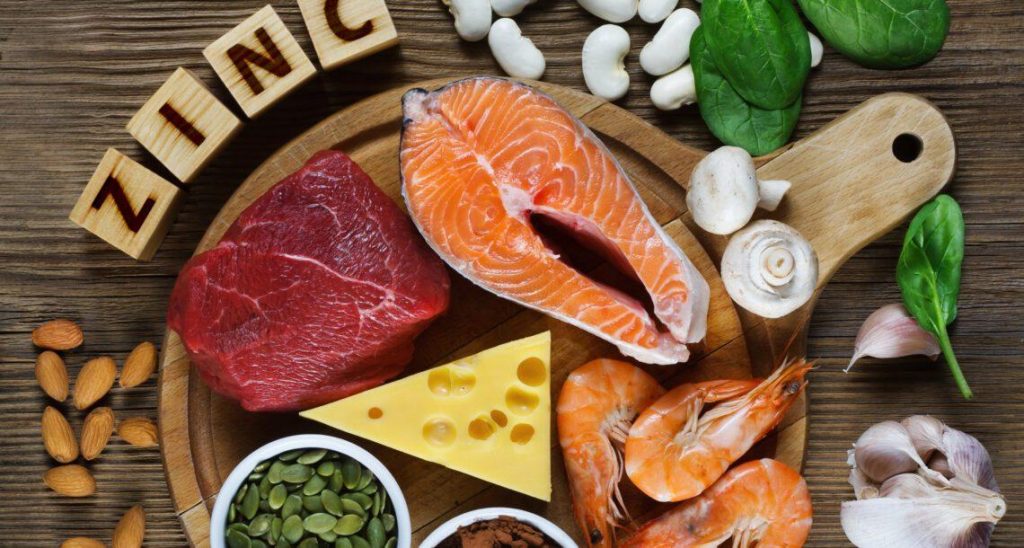
Zinc Rich Foods
One of the better sources of zinc is animal-based foods. This is mainly due to the absence of complexes that obstruct zinc absorption in animal sources, as well as the presence of sulfur-containing amino acids that improve zinc absorption, like cysteine and methionine.
There are many plant-based foods that contain zinc, the problem is that due to their high content of phytic acid (or phytates), they also inhibit zinc absorption. Reports suggest that individuals who don’t consume meat or other animal products, need up to 50 percent more zinc in their diets each day, in order to absorb what they need.
It is also important to note that the inhibitory actions of phytic acid can be minimized by using processes such as sprouting, fermenting, soaking, heating and leavening. Absorption can also be improved by using presoaked legumes, sprouts as well as sourdough breads and yeast-based breads.
However, the inhibitory effects of phytic acid on the absorption of zinc can be minimized with methods like soaking, heating, sprouting, fermenting and leavening. Research also shows that the absorption of zinc can be improved by using yeast-based breads and sourdough breads, sprouts, and presoaked legumes.
If you are looking to increase your zinc levels through dietary sources, consider having 2-3 servings of these zinc rich foods each day:
Lamb
Mushrooms
Pumpkin Seeds
Hemp Seeds
Grass Fed Beef
Oysters
Spinach
Garbanzo Beans (Chickpeas)
Lentils
Avocado
Cocoa Powder
Cashews
Kefir or Yogurt
Ricotta Cheese
Chicken
Almonds
Eggs
In Conclusion
Zinc benefits your health in numerous ways such as reducing oxidative stress and supporting your immune system.
Zinc can help prevent bone loss and maintain bone health.
Zinc is available through many food sources as well as supplements.
Foods with high contents of phytic acid can reduce the absorption of zinc.
Your doctor can order blood work to check and/or monitor your zinc levels
References
1. National Center for Biotechnology Information. (n.d.). Retrieved March 22, 2023, from https://www.ncbi.nlm.nih.gov/books/NBK547698/
2. ME;, C. C. T. N. P. A. S. C. A. S. (n.d.). Recent aspects of the effects of zinc on human health. Archives of toxicology. Retrieved March 22, 2023, from https://pubmed.ncbi.nlm.nih.gov/32394086/
3. L;, W. I. F. H. J. R. (n.d.). Dietary and physiological effects of zinc on the immune system. Annual review of nutrition. Retrieved March 22, 2023, from https://pubmed.ncbi.nlm.nih.gov/34255547/
4. Zinc deficiency – statpearls – NCBI bookshelf. (n.d.). Retrieved March 22, 2023, from https://www.ncbi.nlm.nih.gov/books/NBK493231/
5. Prasad AS;Beck FW;Bao B;Fitzgerald JT;Snell DC;Steinberg JD;Cardozo LJ; (n.d.). Zinc supplementation decreases incidence of infections in the elderly: Effect of zinc on generation of cytokines and oxidative stress. The American journal of clinical nutrition. Retrieved March 22, 2023, from https://pubmed.ncbi.nlm.nih.gov/17344507/
6. Asbaghi O;Sadeghian M;Fouladvand F;Panahande B;Nasiri M;Khodadost M;Shokri A;Pirouzi A;Sadeghi O; (n.d.). Effects of zinc supplementation on lipid profile in patients with type 2 diabetes mellitus: A systematic review and meta-analysis of randomized controlled trials. Nutrition, metabolism, and cardiovascular diseases : NMCD. Retrieved March 22, 2023, from https://pubmed.ncbi.nlm.nih.gov/32451277/
7. J;, L. X. Z. (n.d.). The influence of zinc supplementation on metabolic status in gestational diabetes: A meta-analysis of randomized controlled studies. The journal of maternal-fetal & neonatal medicine : the official journal of the European Association of Perinatal Medicine, the Federation of Asia and Oceania Perinatal Societies, the International Society of Perinatal Obstetricians. Retrieved March 22, 2023, from https://pubmed.ncbi.nlm.nih.gov/31438733/
8. Rasmussen, H. M., & Johnson, E. J. (2013). Nutrients for the aging eye. Clinical interventions in aging. Retrieved March 22, 2023, from https://www.ncbi.nlm.nih.gov/pmc/articles/PMC3693724/
9. ; (n.d.). A randomized, placebo-controlled, clinical trial of high-dose supplementation with vitamins C and E, beta carotene, and zinc for age-related macular degeneration and Vision Loss: Areds report no. 8. Archives of ophthalmology (Chicago, Ill. : 1960). Retrieved March 22, 2023, from https://pubmed.ncbi.nlm.nih.gov/11594942/
10. K;, T. J. K. B. (n.d.). A global perspective on the epidemiology of acne. The British journal of dermatology. Retrieved March 22, 2023, from https://pubmed.ncbi.nlm.nih.gov/25597339/
11. Cervantes J;Eber AE;Perper M;Nascimento VM;Nouri K;Keri JE; (n.d.). The role of zinc in the treatment of acne: A review of the literature. Dermatologic therapy. Retrieved March 22, 2023, from https://pubmed.ncbi.nlm.nih.gov/29193602/
12. AF;, Y. B. E. R. P. S. J. Y. M. (n.d.). Serum zinc levels and efficacy of zinc treatment in acne vulgaris: A systematic review and meta-analysis. Dermatologic therapy. Retrieved March 22, 2023, from https://pubmed.ncbi.nlm.nih.gov/32860489/
13. RR;, S. M. D. (n.d.). Zinc for the Common Cold. The Cochrane database of systematic reviews. Retrieved March 22, 2023, from https://pubmed.ncbi.nlm.nih.gov/23775705/
14. Lansdown AB;Mirastschijski U;Stubbs N;Scanlon E;Agren MS; (n.d.). Zinc in wound healing: Theoretical, experimental, and clinical aspects. Wound repair and regeneration : official publication of the Wound Healing Society [and] the European Tissue Repair Society. Retrieved March 22, 2023, from https://pubmed.ncbi.nlm.nih.gov/17244314/
15. RU;, R. H. U. Q. M. S. K. (n.d.). Influence of dietary zinc on semen traits and seminal plasma antioxidant enzymes and trace minerals of Beetal Bucks. Reproduction in domestic animals = Zuchthygiene. Retrieved March 22, 2023, from https://pubmed.ncbi.nlm.nih.gov/25263460/
16. ER;, P. C. C. B. (n.d.). Zinc, the brain and behavior. Biological psychiatry. Retrieved March 22, 2023, from https://pubmed.ncbi.nlm.nih.gov/7082716/#:~:text=The%20total%20content%20of%20zinc%20in%20the%20adult,hippocampus%20in%20synaptic%20vesicles%2C%20boutons%2C%20and%20mossy%20fibers
17. RS;, M. D. (n.d.). The role of zinc in growth and cell proliferation. The Journal of nutrition. Retrieved March 22, 2023, from https://pubmed.ncbi.nlm.nih.gov/10801966/
18. M;, Y. (n.d.). Role of nutritional zinc in the prevention of osteoporosis. Molecular and cellular biochemistry. Retrieved March 22, 2023, from https://pubmed.ncbi.nlm.nih.gov/20035439/
19. Fatima T;Haji Abdul Rahim ZB;Lin CW;Qamar Z; (n.d.). Zinc: A precious trace element for Oral Health Care? JPMA. The Journal of the Pakistan Medical Association. Retrieved March 22, 2023, from https://pubmed.ncbi.nlm.nih.gov/27524540/
20. IL;, L. P. J. B. R. M. A. E. K. (n.d.). Zinc and cardiovascular disease. Nutrition (Burbank, Los Angeles County, Calif.). Retrieved March 22, 2023, from https://pubmed.ncbi.nlm.nih.gov/20950764/
21. Skrovanek, S., DiGuilio, K., Bailey, R., Huntington, W., Urbas, R., Mayilvaganan, B., Mercogliano, G., & Mullin, J. M. (2014, November 15). Zinc and gastrointestinal disease. World journal of gastrointestinal pathophysiology. Retrieved March 22, 2023, from https://www.ncbi.nlm.nih.gov/pmc/articles/PMC4231515/
22. M;, M. M. M. I. D. R. (n.d.). Lower serum zinc in chronic fatigue syndrome (CFS): Relationships to immune dysfunctions and relevance for the oxidative stress status in CFS. Journal of affective disorders. Retrieved March 22, 2023, from https://pubmed.ncbi.nlm.nih.gov/16338007/
23. Mohammad MK;Zhou Z;Cave M;Barve A;McClain CJ; (n.d.). Zinc and liver disease. Nutrition in clinical practice : official publication of the American Society for Parenteral and Enteral Nutrition. Retrieved March 22, 2023, from https://pubmed.ncbi.nlm.nih.gov/22307488/
24. SK;, M. (n.d.). Zinc in kidney disease. Journal of the American College of Nutrition. Retrieved March 22, 2023, from https://pubmed.ncbi.nlm.nih.gov/2674256/

